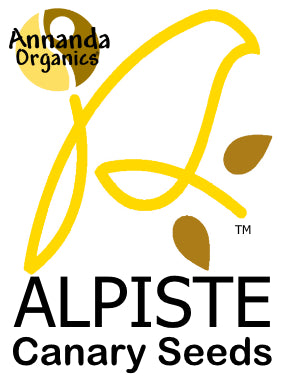Alpiste Canary Seeds - The New Superfood

De-hulled glabrous (hairless) Canary seed that are safe for human consumption are known by its Spanish name Alpiste. It's a new variety of Canary seed that is different from one used as bird food.
Alpiste seeds have a natural, nutty flavor and add a light, crunchy texture to food. They can be added to baked goods, sprinkled on meals, used as flour, or made into milk. Easily used as an ingredient for making bread, cookies, cereals, granola bars, and pasta.
Alpiste canary seeds are a relatively new health food, only recently having enough supply to be commercially available to the North American market.
The health benefits of canary seeds are too good to be ignored.
Canary Seeds - No longer just for birds
While canary seed is often seen alongside millet in bird foods, it is highly nutritious and beneficial for health. This small, protein-packed grain is rich in unsaturated fatty acids, fiber, minerals, and essential amino acids.
However, that doesn't mean you should eat bird food. Canary seeds for birds also contain silica fiber, which the human body cannot digest without complaint and is not safe to eat.

Instead, you should only consume Alpiste canary seeds a new hairless variety that has been de-hulled and is silica-free making it safe for human consumption.
Considered a new superfood, alpiste is a plant-based protein that boosts the nutritional content of a variety of foods, helping increase protein consumption throughout the day. This may be especially useful for those following a vegetarian, vegan, or gluten-free diet.
Using canary seeds to complement sesame seeds or replace other seeds and nuts in food products may reduce the fat and calorie content of food, while also increasing its nutritional profile.
It works well in gluten-free flour blends. Bread made with around 15-25% canary seed flour scored significantly higher in sensory panels than average gluten-free bread, having a high rating for appearance, texture, taste, and acceptability.
History of Alpiste
The canary seed comes from the Canary Islands, a Spanish protectorate off the coast of West Africa. Both the canary seed and canary birds are named after it.
It is the product of the plant canary grass phalaris canariensis, which is primarily grown for birdseed. However, alpiste canary seed has many purposes and can be used in a variety of foods for humans.
In Spanish-speaking countries, the canary seed is known as alpiste, and it is incorporated into drinks, health foods, and supplements. they were classified as safe for human consumption as a cereal by Spanish Royal Decree in 1967.
The seeds were introduced and adapted to the Canadian prairies back in the 70s.
In 2016 the glabrous (hairless) variety was approved for human consumption in Canada and the United States.
It has been approved for the food market by Health Canada, and the FDA has given it GRAS (Generally Recognized as Safe) status.
Alpiste comes in either flour or seed form and can be added to bread, bagels, flour, pasta, or eaten as snack food.
Nutritional Value
Alpiste canary seed has high nutritional benefits.
Many of the vitamins and minerals in canary seeds are higher than in other grains like wheat, oats, and barley. It contains more folate, around the levels of amaranth and quinoa, and has more iron and zinc than quinoa or buckwheat. Its fiber content is comparable to buckwheat.
A half cup of canary seed contains:
- 212 calories
- 55 g of carbs
- 300 mg of phosphorus
- 50 mg of calcium
- 2 g of fat
Compared to many other grains, alpiste has a higher protein content. It has 10 grams of protein for every five teaspoons, or 20% of the recommended amount of protein daily, which is comparable to the protein quality of meat.
These proteins also carry a higher content of essential amino acids like tryptophan, phenylalanine, isoleucine, and leucine.
Canary Seed Ingredients
The canary seed contains bran, germ, and starchy endosperm, making it a true cereal grain in the same family as wheat, oats, barley, and rye. It is rich in folate, phosphorous, magnesium, and manganese.
Alpiste does not contain any gluten, so it is safe for those with gluten intolerance and celiac disease to consume. However, it contains a protein similar to a wheat allergen protein.
Unfortunately, it is currently unknown if it would cause an allergic reaction in those with a wheat allergy.

